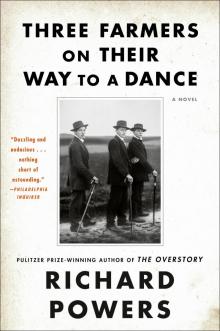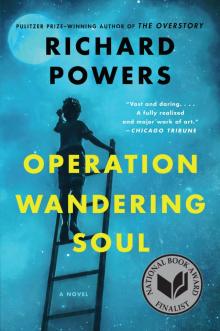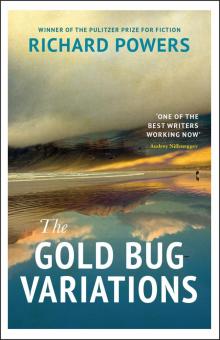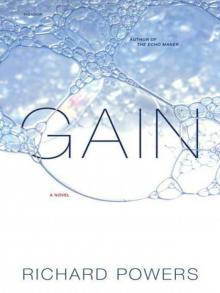- Home
- Richard Powers
Gain Page 7
Gain Read online
Page 7
The sky is an indigo blue swirled with night cloud, like a fabulous Fabergé Easter trinket. The moon lasers a hole in the side of this egg’s shell, through which God could blow out the runny yolk of the world.
Lying in this empty bed, head just below the sill, she could scan the peaks of her Scotch pines and Lombardy poplars. She and Don bought this house because of those poplars. How they throw about the midnight moonlight. Summer nights, it feels like her very own coastal cottage, even here, even in Lacewood, a thousand miles from the nearest sea.
How can Lacewood live, so far inland? The best that developers can do here is to set fake lakes lapping at the shores of new subdivisions. All the latest living communities, even the strip outlets, named for nonexistent water. Baytowne. Harbour View, with that silly little sailboat logo. Insane, of course. But anything vaguely nautical is easier for her to sell. And so the state is littered with invisible inland seas.
The moon that soaks her sheets glints, too, on these artificial whitecaps. Fabricated cornfield maritime beckons beneath her window, a view she isn’t even home to indulge in tonight. And this is her ocean deliverance, the closest she will come to her fjord, her coastal opening.
She left the window open just a crack when she checked into the hospital. Otherwise smells accumulate. Unpleasant odors, when the place is closed up. Probably radon, too.
The breeze that flushes these rooms imports its own aromas: stubborn lilacs and stultifying magnolias. Ozone from dry lightning, forty miles distant. Swiss almond decaf from the new coffee shop, half an hour from its red-eye opening. Organophosphates wafting in from the south farms. Undigested adhesives slipping up Clare’s smokeless stacks. The neighbors’ gerbil food and scoopable cat litter wafting over her fence in two parts per billion.
But mixed together in the air’s cross-breeze, these smells sum to a shorthand for freshness. The day’s background radiation. The scent that pine and poplar sprays, too clean in their chemical mimicry, can never quite emulate.
The house sits empty now, the scene of local evacuation. Her bedroom dark, except for the green light of her abandoned VCR, still blinking twelve, as on the day she took it from the box. Downstairs, her major appliances go on quietly working, keeping their programmed vigils. Delinquent burglar alarms ring the property, electronic sentries she never learned to activate, despite her husband’s repeated efforts to train her. From her hospital bed, she hopes their mere existence will act as a deterrent. Ward off the easily impressed robber.
Someone might walk into her unguarded house and pillage it. Might pull up in a Mayflower van, posing as professional movers. Neighbors would take it in stride: the broken Bodey family, off on their next pilgrimage. Banks or the government might exercise eminent domain, rescind all the belongings that the three of them laid claim to. Reclaim all things durable or fleeting, natural or invented.
Everything she owns could disappear in her absence. Everything could vanish, from great-gran’s priceless filigree to the cubic zirconium pierced-ear posts that Tim wrapped so patchily for her last birthday. Ellen’s CD collection, the runaway hits now such passé embarrassments that only the most indiscriminate looters would take them. The computer, with its four game-years of Panzer Attack and its two real-years of irreplaceable client files. The Toshiba and the Westing house and the Sanyo. The records and canceled checks. The carpet smells. The Wamsutta sheets, faithless in moonlight, ready to serve whoever might steal them.
What happens to stolen things? Could she stumble across her own clothes someday, in an innocent resale shop? Does the fenced piece of filigree still carry her great-grandmother’s ghost? Does the purchaser of hot data take over her clients? How much can a wallet photo of her kids be worth to a thief?
When the airplane ticket with your name on it disappears, the seat flies empty. Does the world get poorer when a hundred-dollar bill falls down a sewer? For that matter, does the world get richer when we strike gold or cut down trees?
What does it mean, to own something? Twenty-two hours of work equals one mulching mower plus shipping, handling, and tax. What is “handling,” anyway? How much can such a thing really cost? Can someone work for nothing? What rises or falls in the country of human ransom when a fireproof safe goes up in smoke or a coffee maker arrives free in the mail? How do insurance companies decide how much to give you when starting you up again from scratch? How often can you start from scratch? And what about stopping from scratch?
She asks herself these questions, the ones people ask only on light-flooded nights, when comforts go ephemeral, threats solidify, and the town unmoors on its self-dug seas. She imagines herself wandering between her house and this hospital, where she lies on white percale. In her thoughts, she walks down to the old part of town, under much this same moon. Her mind strolls past the Riverton Mansion, where the Lacewood Historical Society, time’s ground squirrel, digs up its stocks of artifact buried in bygone winters.
She’s taken the kids once or twice. Townies can visit the museum for free. The mansion is a century-old, fossilized version of the Bodey split-level. Filled to the brim with fetish and talisman. Downstairs is a reconstructed apothecary shop from 1876. Its shelves sag under canisters, once the keepers of life-or-death cures, now collectible Sotheby’s gewgaws.
Upstairs, in the nursery, the porcelain beauties in bloomers pout. The wooden palefaces and redskins stand erect in clothespin circumspection. The dumbwaiter that once transmitted the hour’s urgencies is fused fast. Smoky, Gilded Age oval frames, like monster convex lockets, all bear restored portraits of heirs and heiresses. The pantry overflows with Depression glass, magnificently obeying the law correlating a decline in affluence with bursts of artistic fervor.
How long ago did she last take the kids through? An idle Labor Day four, no, five years already. She parked them in front of the hand linen press. The coal stove. The little toy horse. She asked them all the right questions. How in the world did they ever build these things? Make them work? Everything from zero. Think what it must have taken to . . .
But the kids wouldn’t rise to the invitation. The thought was as lost as those archaic crafts—as carving or casting or filigree.
For the three of them live in a house trapped in its own made things, hard on the coast of a man-made ocean. A house whose uses she only sees tonight because she is not there. She looks up from her percale raft at the hospital clock. In squared red bars, it reads: 3:08 AM. Around her mechanical bed hum meters and dials, each one cold with purpose.
On the sixteenth of January 1840, a year and a half after the U.S. Exploring Expedition drifted from the Hampton Roads slips, Ben Clare’s ship the Peacock sailed within sight of a new continent. The Assistant Scientific stood on deck, drawing the scene into his journals. His otherwise empirical hand capitulated on that day to dread and wonder. Sketch after sketch probed the pitiless expanse of field ice, while the black bowsprit beneath him plowed on into blinding white.
Passed Midshipman Eld had seen land first, from the rigging. Eld, the man who made a mockery of the Scientifics’ efforts. Who slaughtered a mass of birds to demonstrate their lack of prior human contact. Who kicked half a rookery of Eudyptes chrysocome down a precipice on Macquarie Island, because the penguins had pecked at his trousers. Eld, the ass, held in contempt by all aboard ship, now promoted to a deathless landmark.
All that day, in mounting despair, the crew had sung that dirge of a fuguing tune, Idumea. Kentucky Harmony, United States Sacred Hymnody, on that Republic’s fledgling mission to the sole place where commerce had not yet penetrated:
And am I born to die,
To lay this body down?
And must my trembling spirit fly
Into a world unknown?
A land of deepest shade
Unpierced by human thought,
The dreary regions of the dead
Where all things are forgot!
But after that day’s momentous discovery, these same lines seeped up from the gun deck, bruised with
American ingenuity. Some blasphemous bosun’s mate uncorked his lungs in an airy magnum, lyrics for a newfound land, here at the edge of the known globe:
And was she borne to sigh?
To have her body ploughed?
And must his trembling finger fly
Into her patch so proud?
Embargoed sailors toasting a harlot’s trade goods, a score of degrees south of the last idea of woman. No song was what it was except through the alchemy that cunning humanity worked upon it. Yet all human invention, however impious, begged the same grace. Forgive this song that falls so low beneath the gratitude I owe. It means Thy praise, however poor. An angel’s song could do no more. And God, in His arsenal of ironies, might yet find it in His heart to forgive men their deep and leeward progress into unknown regions.
Surely He forgave the joy of a nation that dared such an enterprise. Congress’s grandest hopes for the expedition fell short of the glory now in hand. If any of the squadron made it back to port, years from that moment, they would bring with them such a return on Washington’s investment as never yet rewarded government money.
Rumor of a southern continent had flown for years. But rumor vanished into fact when Commander Wilkes entered Eld’s mountains in the voyage’s log. Now humanity lived to drag foot onto that new land and mark it, to step into the impossible place before surrendering one’s hostage body to death. The urge for a worthless souvenir grasped the crew more fiercely than drink seized a Temperance signer. On the thirteenth, when the Peacock anchored on a berg larger than Boston Common, the men had descended to scuffling over odd chunks coughed up from the ice from the earth’s outermost peaks.
For several days, Clare had fought to keep his journal writings worthy of an assistant collections specialist aboard this exploration. Yet the scientific truth remained: no man save the few aboard this empirical armada could credit the uncanny region. A hellish barrier of ice blasted them with ruined cloisters, icy crenellations and caprices, wind-masoned ogive vaulting, sculpted follies through whose mighty fissures flocks wheeled.
Life in these latitudes teemed so profusely that it startled even Dr. Pickering and Mr. Rich. Botanist and zoologist alike fell back, embarrassed by their insufficient catalogs. Monster fish hauled from great depths harbored yet more monstrous half-digested specimens in their entrails. Unnamed animalcula massed in numbers sufficient to employ the Scientifics until the end of their days.
Well above the crow’s nest, fairy pinnacles gaped down on the ship, spattered like a candle left in a windy casement. In front of Clare lay the immeasurable solitude of terra incognita. The polar region. And not a hole in the earth’s crust as far as sextant could see.
Not that anyone in the expedition had ever credited the theory. The voyage was never more than another unholy alliance, a marriage of convenience in the Go-Ahead age. From the start, the Hole in the Pole was the solely owned idea of John Cleves Symmes—the Newton of the West. To all the world! Symmes wrote:
I declare the earth is hollow, and habitable within; containing a number of solid concentrick spheres, one within the other, and that it is open at the poles 12 or 16 degrees; I pledge my life in support of this truth, and am ready to explore the hollow, if the world will support and aid me in the undertaking.
John Quincy Adams had seen enough in Symmes’s rant to shepherd the exploration through a Congress so hostile that some legislators considered the mere idea of national backing unconstitutional. But the nation sought a higher presence in the southern seas, and a hunt for the polar hole captured the public’s imagination enough to make a voyage seem cheap at the price.
The Scientifics proved willing to use the Hollow Earth to secure funds. The Navy, in turn, exploited the Scientifics. Finally the whalers, in that great food chain, fed happily on the Navy’s vested interests. So long as research’s goal fell in sea-lanes so full of shrimp and fish, commerce was a great believer in research.
To Ben Clare, fresh from Cambridge’s lecture halls, Symmes might as well have been one of those tattooed priests of the god Tangaloa that so fascinated Mr. Hale, the philologist, during ships’ landfall in the Samoan group. Clare rejected all of Symmes except his philosophical refrain: Light gives light, to light discover—ad infinitum. No one knew just what was plausible in this world, what laughable, what tragic, what obligatory, what contemptible. But man possessed the means to find out. Discovery was man’s duty, until all the earth’s surfaces were lit.
Now the hole had been definitively filled, and in its place stood mountains. The globe stood fleshed out, the map completed. Thy sea is so great, and our craft so small, O Lord.
Ben Clare gazed out on the whited, virgin landscape, for a last moment, still free of human visit. He debated the use of this new land the way, as an undergraduate, he had wrestled with every issue under the sun. Resolved: The President ought to renew the Bank’s charter. Resolved: Botany merits the creation of its own formal professorship. Resolved: Land should be made available to any able-bodied, enfranchised man at no cost beyond settlement. Resolved: Old Zip Coon is a very learned scholar. Below his feet, the prurient Idumea gave way to a lustier Blow ye winds, high-o. They say you’ll take five hundred sperm before you’re six months out. Blow ye. Blow, boys, blow. The notes flew out upon an antarctic breeze, froze, and fell back to the antipodal ice.
In the days following the sighting of land, Clare occupied himself with organizing the specimens taken from South America and New Holland. He helped the geographers haul their magnetic equipment onto the pack ice. On the twentieth, he watched a cetacean hurl itself fully out of the water while a predator killer hung locked to the thrashing jaws. Two days later, Mr. Eld succeeded in capturing a colossal king penguin. As the Commander later wrote:
He was taken after a truly sailor-like fashion, by knocking him down. The bird remained quite unmoved on their approach, or rather showed a disposition to come forward to greet them. A blow with a boat-hook, however, stunned him . . . He showed, on coming to himself, much resentment at the treatment he received . . .
Overnight, the Peacock received the same treatment at the hands of the malevolent region. She was alone, having lost contact with the flagship Vincennes and the others some time before. While endeavoring to evade a floe that materialized under her bow, the ship came about, colliding so violently with a second ice mass that the stern seemed entirely stove in. No longer steerable, the ship drifted into the ice. They drove stern foremost into the ice barrier. The second blow finished off the rudder, broke two of the pintles, and shattered both braces.
The wind chose that moment to revive, and despite spars fitted out along the hull, ice set upon them as dogs on a stricken doe. The ship slammed into a berg towering above the mastheads, grounding her larboard stern. Impact tore away the spanker boom and stern davit while crushing the stern boat. The knee that bound davit to taffrail broke off, carrying with it all the stanchions as far as the gangway.
By blind fortune, the ship canted into the last free water, missing by inches the fall of an ice crest that would have atomized it. Luck seemed to spare them for a worse fate: slow death upon whatever floating waste they might lash to. While danger threatened, the crew had acted with a mechanical competence. Now they fell to considering the destinies each would face alone. The Pole, it occurred to Benjamin Clare, late of Clare’s Sons, Roxbury, indeed bore a hole deeper than all cartography.
Ice condensed around the hull, threatening to crush the ship and reclaim the keel’s slit. Clare looked on his white mausoleum. He would never decompose, but would enjoy the corporal eternity sought by all industry. The ship, after centuries of pressing, would someday work back up through the ice layers to be coughed up at the feet of later explorers, a square-rigged diamond.
Desperate, the crew employed a berg as a lee helm, performing with the efficiency of those already lost. Benjamin joined a boat aiming to run out a line to swing the ship’s head toward the last capricious wisp of open sea. He stood mere miles from the earth’s
static axle, so close to the Pole that the air lost all convection. He affixed himself to the rope that would either free the ship or tie them like bunting to a coffin. He wrapped the cable through his hands and pulled.
Some minutes passed in the motionless tug-of-war. All terror over the disintegrating Peacock vanished, like the visions of an opiate dream. A perfumed thread entered Clare’s nostrils: an old, lifelong friend. Yet he had never smelled its like. A scent wafted upon him, a redolence for all the world like the smell of a forgotten existence.
For seventeen months, the stench of sail had attacked him without respite. Each day was a carnage of tainted foods, island incense, brine-soaked winds, overripe fruits, acrid invertebrates rotting on the deck, putrefying soft-bodied conches that the captain would not allow below. He lived smothered in flesh, ten dozen men who laved by lunar calendar, if that often. Fetid fragrance had so ruled his every inhalation that the thing he smelled, out on the ice, was the sachet of scent-lessness: air before the employment of lungs.
He worked the idea out, as the crew fought to tether the ship from oblivion. This atmosphere grew so gelid, the spin of the earth so still, that air’s larger molecules—those smells that otherwise relentlessly bombarded human nostrils—here dropped frozen to the pack ice, awaiting a thaw that, in some distant future, would awaken olfaction.
The ship’s fate now became a matter of indifference. The Benjamin Clare who had signed on with the first U.S. Exploring Expedition eager to serve in his capacity of collector and cataloger of plants, that son of Harvard who awaited the day when human triangulation would fill every empty spot on the map, perished out on the pack ice of newly christened Wilkes Land, finished by his first whiff of nothing.
Frenzy and fluke somehow combined to shove the Peacock’s prow loose into the last free cleft in the ice barrier. At midnight, the sea rose and the ship shot down a canyon no broader than its own width. While crags crashed against both gunwales and the crew clamored with activity, Clare savored the taste of the thing he had taken into his lungs. He joined in the celebration at the ship’s deliverance. He, too, waved mad flares, shot his pistol, poured out wine on the pack ice that had spared them. But the trace nosegay lingered in him, a postmortem sense of the senses’ lie.

 The Overstory
The Overstory Bewilderment
Bewilderment Three Farmers on Their Way to a Dance
Three Farmers on Their Way to a Dance Operation Wandering Soul
Operation Wandering Soul Prisoner's Dilemma
Prisoner's Dilemma The Gold Bug Variations
The Gold Bug Variations Generosity: An Enhancement
Generosity: An Enhancement The Echo Maker
The Echo Maker Orfeo
Orfeo The Time of Our Singing
The Time of Our Singing PLOWING THE DARK
PLOWING THE DARK Generosity
Generosity Gain
Gain